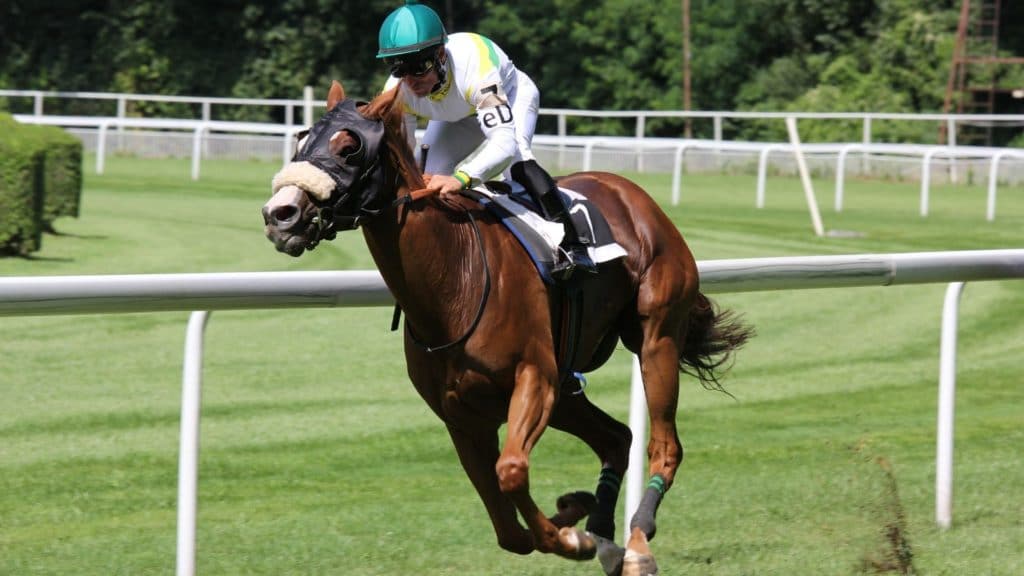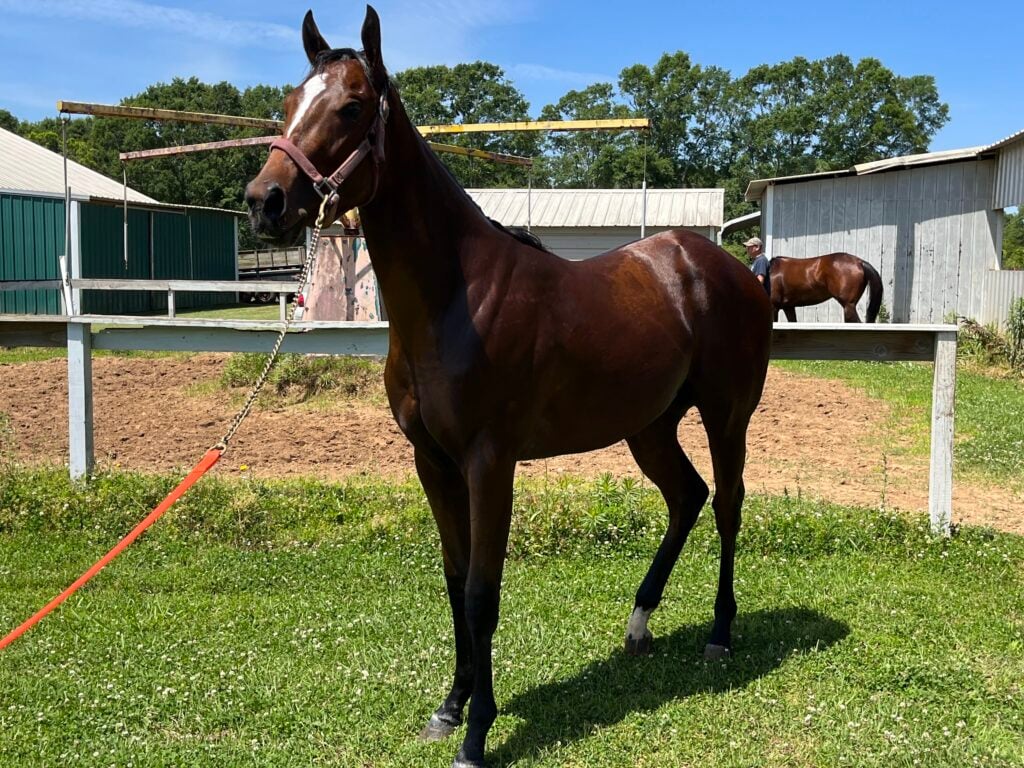Last updated: May 2, 2022
A friend of mine recently asked why breeders don’t clone the best racehorses. She is very interested in horse breeding and wanted to know if cloned horses can race or does the racing associations ban cloned horses from competing.
Cloned horses cannot race in either Thoroughbred or Quarter horse races, which are the foremost racing breeds. However, Arabian horses allow cloned horses to race, and the International Federation for Equestrian Sports (FEI), permits cloned horses in Olympic sports.
Many equine organizations believe cloned horses have an unfair advantage in racing over their naturally-bred counterparts. However, cloning animals is a relatively new tradition, and there are many misconceptions regarding cloned horses and how they compare to normal equines.

Is it fair to use cloned horses in competition?
Since cloning isn’t cheap, breeders typically choose to clone horses with a successful racing record and a superior pedigree. Because naturally, a breeder would only spend large sums for breeding the fastest and best-bred horses.
People, therefore, assume cloned horses have an advantage in competitive racing that horses produced naturally can’t match. However, there is no evidence that cloned horses perform any better than any other naturally-bred horse.
The reason is simple. They may share their DNA with famous horses, but they still lack the years of training and favorable environment that truly determine a racehorse’s success.
Cloned horses display the same mental behaviors and capabilities as any other horse. They need adequate nourishment to fully develop their bodies and constant exercise to build their muscles.
Most importantly, training them for competitive racing requires the same time and effort as horses produced through traditional methods. The only potential advantage that cloned horses have is not directly related to their competitive performance.
Cloned horse owners can usually be optimistic about their foal’s adult physical attributes. In contrast, people who invest in naturally-bred horses can’t be sure of some of the horse’s most defining features, such as height, muscle mass, or even medical immunity.
Some breed registries prevent cloned horses from racing.
To race in North America, a horse must be registered with its breed organization. For Thoroughbreds, horses must register with the Jockey Club, and Quarter horses must be members of the American Quarter Horse Association (AQHA).
Neither the Jockey Club nor the American Quarter Horse Association accepts cloned horses in their registry. They are on the same page with cloned horses but differ in other aspects of breeding.
The AQHA accepts horses produced through in vitro fertilization and artificial insemination. However, the Jockey Club does not. They require all offspring to be the result of “live cover” breeding.

Is cloning horses ethical?
As mentioned above, cloned horses don’t present any moral concerns concerning their competitive position. However, I’ve often wondered if the act of cloning animals itself is unethical and if there is something questionable about this whole “artificial breeding” process.
One primary concern that people have with horse cloning is that the offspring created through cloning are more susceptible to abnormalities or fatal diseases.
Some even claim that cloned horses don’t live as long as naturally-bred horses, and because of this, cloning horses is a bad practice. However, there isn’t a significant amount of data to support such claims.
The lack of data is partly because of how uncommon cloning is in equines and how few relevant studies have been conducted. Still, most research suggests that cloned horses born healthy will be just as healthy and long-living as offspring produced through natural breeding.
In contrast, there is a pretty valid concern regarding high embryo deaths and horse cloning’s low efficiency. Any method of artificial animal reproduction isn’t considered commercially viable. One reason is the high cost, and the other is the low success rate.
Sadly, most attempts at cloning a horse fail due to complexities during pregnancy and lead to abortions or stillbirths. However, as researchers are developing a better understanding of cloning, the number of unsuccessful attempts has been steadily decreasing.
There are yet other moral concerns that haunt many people; namely, cloning is an unnatural and inappropriate reproduction method, and creating the exact physical copy of a horse through artificial means is unacceptable.
Of course, there is no way to resolve such objections, as they are purely a matter of personal stance and don’t directly concern the horses involved.
As far as cloned horses’ physical well-being is concerned, if you can get over the possibility of unsuccessful pregnancies, there is no ethical obstacle to worry about.

What is the cost of cloning a horse?
Typically, stallions earn their owners a “stud fee” when they breed a mare and produce a live foal. Stud fees can be very lucrative because the stallions preserve the bloodlines and conformation of racing horses, which is very valuable among horse owners.
The stud fee for stallions with a track record of producing successful offspring is typically more than $100,000. The Irish horse champion Galileo was reported to have a stud fee of $800,000.
The price to clone a horse in the past was well over $150,000. However, as more organizations are offering cloning services, that number has consistently dropped. Viagen Pets, the Texas-based pet cloning company, offers to clone a horse for $85,000 and believes that prices will only go down in the future.
Who was the world’s first cloned horse?
The first horse to be successfully cloned was Prometea, a female foal. In 2003, she became the first equine twin of her own surrogate mother. The Italian researchers fused the mother’s skin cell with an empty egg taken from another horse and returned the resulting embryo to the mother’s womb.
However, this success wasn’t without sacrifices. Prometea was an example of a healthy equine embryo that stood apart from 840 other seeds, all of which were lost during the early stages of development.
For this reason, her birth on May 28th was generously celebrated among researchers and breeders alike.
Two years later, those same scientists oversaw the second cloned horse’s birth – the racing champion Pieraz. This time, the embryos’ success rate was 15%, a significant increase from the initial 3%.
Since then, several renowned horses have been cloned, and the resulting horses are more or less celebrities.

Why do people clone horses?
If you’ve ever witnessed the loss of the last member of a long generation of any pet, you would know why cloning is so valued.
People clone horses’ primarily to preserve bloodlines or maintain a personal connection with a beloved horse. In case the horse dies unexpectedly or is gelded at a young age, it can be beneficial to still forward their genes.
But that’s not the only reason why cloning is so valuable. Racehorses or other famous horses sell their semen for thousands of dollars, while the horses themselves are much more expensive. Thus, breeding more offspring of a top stallion makes for a very effective commercial strategy.
How many cloned horses are there?
Given the fair amount of stigma surrounding horses’ cloning, most owners prefer to keep the true nature of their horse’s information private. Keeping quiet about a cloned horse is especially true for those taking part in competitive sports.
Such a low-profile attitude is not surprising considering that every rider’s dream is to sit on the back of a famous, top-level horse. Knowing that your opponent rides the genetic copy of just such a horse while you had to work your way around an ordinary foal tirelessly can lead to problems for the owners of cloned horses.
This and the fact that many major equestrian sports organizations such as the Jockey Club only recognize naturally-bred horses make it challenging to keep track of every horse cloned.
However, it’s safe to say that since the creation of the first cloned horse in 2003, at least a few hundred horses have been cloned. I know that some polo ponies are cloned and the practice seems to be expanding to other equine sports.
Below is a YouTube video about cloned horses you might find interesting.
Related articles:
- What Is Horse Racing with a Cart Called? and What’s a Sulky?
- Why Do Thoroughbred Racehorses Have the Same Birthday?
- Why are Racehorse Names so Weird? 15 Funny Examples!
- Why Do Racehorses Have to Pee so Bad? Fact, Fiction & Causes
- Horse Races Are Run Counter-Clockwise, Do You Know Why?
- How Far Can Horses Run: without Stopping, and at Full Speed?

About the Author: Miles Henry
Lifelong Horseman | Racehorse Owner | Published Author
Miles Henry brings over 25 years of hands-on experience training and owning Thoroughbred racehorses. Raised with Quarter Horses and Appaloosas, he’s spent a lifetime learning from horses—on the track, in the barn, and in the field. Today, he runs a small but successful racing stable in Louisiana and shares real-world insights on HorseRacingSense.com, helping horse owners, fans, and bettors navigate the sport with confidence.
📚 Books: View Miles’s books on Amazon »
🎧 Podcast Guest: Animal Tales Ep. 32 |
YouTube Interview
📩 Newsletter: Sign up for racing tips and horse care advice »
🔗 Follow Miles:
Twitter |
Facebook |
YouTube


